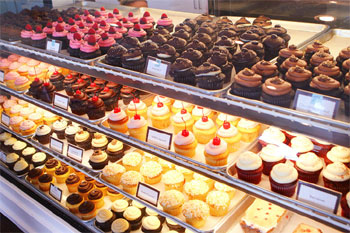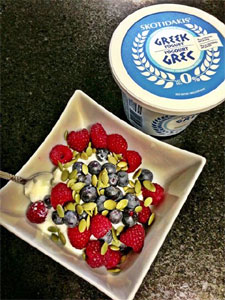How Can I Tame My Intense Sugar Cravings?
![]() I just love sugary snacks, pies, cakes and candies! I find it extremely difficult to stay away from indulging in these goodies at night when at home on the couch and I’m starting to gain some serious weight. I would like to know how to tame my intense sugar cravings so I can eat healthier and start losing weight?
I just love sugary snacks, pies, cakes and candies! I find it extremely difficult to stay away from indulging in these goodies at night when at home on the couch and I’m starting to gain some serious weight. I would like to know how to tame my intense sugar cravings so I can eat healthier and start losing weight?
![]() Some people can’t resist the temptation to eat sweets on a daily basis and this addiction can wreak havoc with individuals who are trying to succeed with a weight loss program. It’s important to understand what exactly sugar is and how it affects your body. Sugar is a great source of energy because it requires very little digestion. It is absorbed through the intestinal wall unchanged, and it is incorporated in the cells of your body as a result of insulin secretion in the pancreas, which opens the cellular “gates” for sugar. This easy method to obtain energy from sugar can rapidly become an addiction, which translates into an increased pressure on the pancreas to produce increasing quantities of insulin to handle the absorbed sugar.
Some people can’t resist the temptation to eat sweets on a daily basis and this addiction can wreak havoc with individuals who are trying to succeed with a weight loss program. It’s important to understand what exactly sugar is and how it affects your body. Sugar is a great source of energy because it requires very little digestion. It is absorbed through the intestinal wall unchanged, and it is incorporated in the cells of your body as a result of insulin secretion in the pancreas, which opens the cellular “gates” for sugar. This easy method to obtain energy from sugar can rapidly become an addiction, which translates into an increased pressure on the pancreas to produce increasing quantities of insulin to handle the absorbed sugar.
The brain can become addicted to sugar before any other organs because the neurons, or the brain cells, are unable to burn fat as a source of energy, unlike the muscles. The brain is, therefore, highly dependent on a normal blood sugar concentration, which is easily replenished through additional sugar intake contained in sweets. So what is the problem, after all? If sugar is such a perfect and easy source of energy, why aren’t we able to survive on sweets and forget about meat or vegetables? Although sugar and other carbohydrates are an important component of your diet, your body also needs protein and fatty acids.

Sugar is a great source of energy only when its concentration in the bloodstream is within a normal range. A lower blood sugar can cause neurological problems since the brain is not able to function optimally without a steady supply of sugar. A high blood sugar results in an excessive stimulation of the pancreas to produce more insulin, which can lead to diabetes. Moreover, the excessive sugar is rapidly converted to fat, which may result in obesity and type 2 diabetes.
Eating sweets on a regular basis is therefore not a good habit at all, and it should be replaced with healthier dietary habits. Fortunately, not all carbohydrates are bad. In fact, the carbohydrates that are found in oatmeal, legumes and vegetables are substantially healthier than pure sugar because they are slowly digested nutritional components. In other words, after digestion, the carbohydrates contained in brown rice or sweet potatoes will also convert into glucose (sugar), which is the basic building block of all complex carbohydrates, but the transformation and sugar absorption is gradual and gentle. It allows a steady assimilation of sugar released from the digested complex carbohydrates rather than an abrupt absorption of enormous amounts of pure sugar.
It’s important to try to replace sweets (candies, cakes, cookies) with starchy carbs like sweet potatoes, oatmeal, brown rice and whole wheat bread. These foods have a low glycemic index (GI), which is a parameter that measures the speed at which a given food can cause an increase in blood glucose levels. They also contain dietary fiber, which further slows down the conversion of starch and complex carbs into sugar. This substitution may not sound too exciting for you initially, but your body will soon adapt to the usage of healthier carbs and “forget” about those intense sugar cravings.
 If the transition from sweets to starchy vegetables is difficult for you to achieve at first, and you still need to feel the “sugar” kick, then you can adopt an easier intermediate strategy. Certain fruits, such as bananas, oranges, peaches, plums or pears, are also rich in sugar, just like your favorite sweets. However, these fruits also contain fiber, which helps to slow down the absorption of sugar. Replacing sweets with fruit juice is a bad strategy since all the fiber is removed during the juice production process and it remains in the fruit pulp. Many of the fruit juices in grocery stores don’t contain much real fruit juice at all so make sure to read the labels carefully. It’s also much better to eat your fruit versus drink juice since liquid calories can add up quickly. By eating whole foods you will be able to chew them and that helps with satiety which is the feeling of being full.
If the transition from sweets to starchy vegetables is difficult for you to achieve at first, and you still need to feel the “sugar” kick, then you can adopt an easier intermediate strategy. Certain fruits, such as bananas, oranges, peaches, plums or pears, are also rich in sugar, just like your favorite sweets. However, these fruits also contain fiber, which helps to slow down the absorption of sugar. Replacing sweets with fruit juice is a bad strategy since all the fiber is removed during the juice production process and it remains in the fruit pulp. Many of the fruit juices in grocery stores don’t contain much real fruit juice at all so make sure to read the labels carefully. It’s also much better to eat your fruit versus drink juice since liquid calories can add up quickly. By eating whole foods you will be able to chew them and that helps with satiety which is the feeling of being full.
Instead of devouring a piece of cake, chocolate or other tempting sugar snacks, enjoy a colorful and tasty fruit salad. Remember that fructose, also known as fruit sugar, is stored in the liver which can only hold around 50-100 grams of glycogen. Once you fill this up, it spills over and gets converted into fat and stored as adipose tissue (body fat). So remember that even though fruit is very healthy and is great for a sweet snack, it’s not a green light to eat unlimited amounts of it. Have a few pieces of fruit early in the morning and if needed, include another piece at night when your sweet tooth rears its ugly head.
Once you are able to reduce you consumption of empty calorie and highly refined sweets, gradually incorporate low sugar fruits and other healthy carbs for a complete transition to a clean diet that is recommended by physicians and dietitians. Reducing your consumption of regular soda and replacing it with diet soda is also a useful habit. Chewing gum is another way to reduce food cravings in general, and sugar cravings specifically, since it simulates the initial stages of food digestion through chewing and salivation. Make sure to also maintain a proper intake of lean protein by adding fish, lean meats, nuts and eggs to your diet which really helps with satiety.
-
What is The Best Repetition Range To Build Muscle?
I overheard a couple of massive and ripped bodybuilder
-
Why Can’t I Lose Weight Despite Tons of Exercise?
I have started to get back in shape. I was always acti
-
How can a chocoholic learn to stay away from chocolate to lose weight?
How can a chocoholic learn to stay away from chocolate to lose wei
-
What is 99 pound in stone?
What is 99 pound in stone? 7.0714286
-
Can losing a lot of weight affect your menstrual cycle?
Can losing a lot of weight affect your menstrual cycle?
-
What are Some Tools To Analyze Muscle Mass and Body Fat?
I’m 63 years old and I currently weigh about 180
- DON'T MISS
- How Many Sets Should I Do for Butt Shaping Exercises?
- Should I Be Changing My Workouts and Training Routines?
- Can I Drink Lots of Milk and Still Lose Weight?
- How many pounds should a 5 foot woman weigh?
- What Healthy Meals and Snacks Can I Eat To Lose Weight?
- Which Exercises Will Help Reduce My Big Breast Size?
- How Many Grams of Protein are in Egg Whites vs Egg Yolks?
- How Can I Build Up My Deltoids and Broaden My Shoulders?
- What are The Best Workouts and Exercises for a Bigger Butt?
- Do Curves Exercises and Workouts Really Work?




